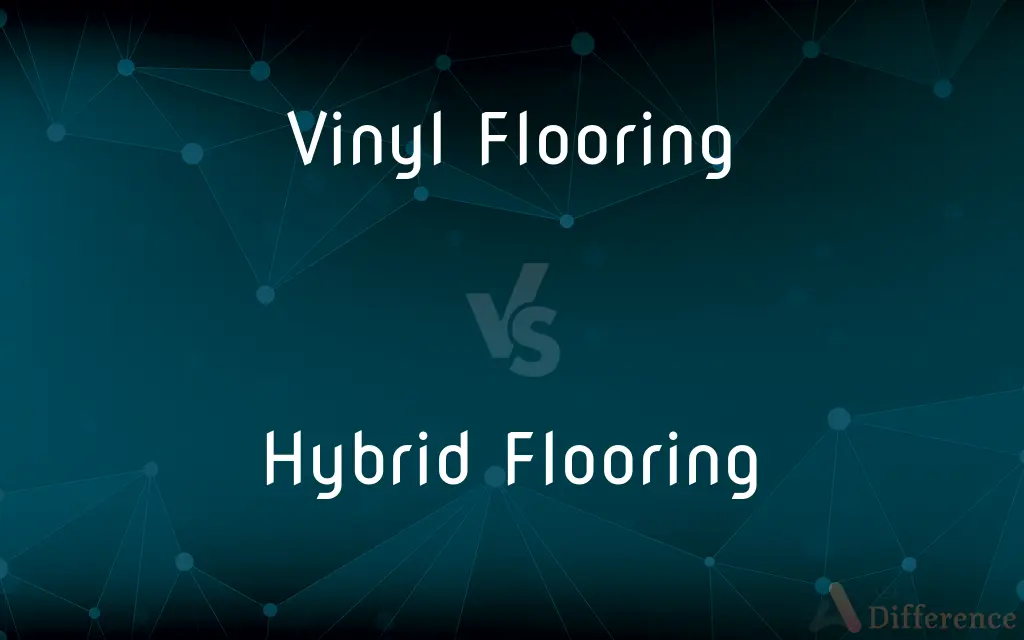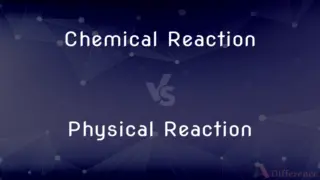Vinyl Flooring vs. Hybrid Flooring — What's the Difference?
By Tayyaba Rehman & Maham Liaqat — Published on July 23, 2024
Vinyl flooring, known for its affordability and water resistance, is ideal for high-moisture areas, whereas hybrid flooring combines the durability of laminate with the softness of vinyl, offering a robust solution for varied environments.

Difference Between Vinyl Flooring and Hybrid Flooring
Table of Contents
ADVERTISEMENT
Key Differences
Vinyl flooring is celebrated for its cost-effectiveness and excellent water-resistant properties, making it a suitable choice for bathrooms and kitchens. Hybrid flooring, on the other hand, merges the best features of laminate and vinyl flooring, providing a tough yet comfortable underfoot experience suitable for almost every room.
Both types of flooring come in a range of designs and patterns, with vinyl flooring offering a slightly softer feel, enhancing comfort in spaces where you might stand for long periods. Hybrid flooring, however, boasts improved durability and stability, thanks to its multi-layer composition, making it a better choice for high-traffic areas.
Installation of vinyl flooring is generally straightforward, often involving peel-and-stick tiles or sheets that homeowners can install themselves. Hybrid flooring, while also designed for easy installation, typically uses a click-together mechanism that creates a floating floor over the existing surface, offering a slightly more complex installation process but with a more secure fit.
In terms of maintenance, both flooring options are low-maintenance, requiring regular sweeping and occasional mopping. However, hybrid flooring's additional durability layer offers better protection against scratches and dents, making it more suitable for homes with pets or children.
Vinyl flooring is highly water-resistant, making it ideal for wet areas, whereas hybrid flooring offers enhanced water resistance with added stability, thanks to its composite core, making it suitable for a broader range of environments, including those prone to temperature fluctuations.
ADVERTISEMENT
Comparison Chart
Composition
Made primarily of PVC
Combination of PVC and other materials like limestone
Durability
Good, suitable for moderate traffic
Excellent, designed for high traffic
Water Resistance
Excellent
Superior, with added stability
Installation
DIY-friendly, peel-and-stick or glue-down
Easy, click-lock system, more secure fit
Comfort & Feel
Softer, more comfortable underfoot
Slightly firmer, with better stability
Compare with Definitions
Vinyl Flooring
Vinyl flooring is known for its water resistance.
It's often used in bathrooms and kitchens.
Hybrid Flooring
Provides superior water resistance and stability.
Hybrid floors can handle temperature changes well.
Vinyl Flooring
It is a cost-effective flooring option.
Many homeowners choose vinyl to save on costs.
Hybrid Flooring
Features a click-together installation.
This allows for a floating floor setup.
Vinyl Flooring
Comes in various designs and patterns.
You can find vinyl flooring that mimics hardwood.
Hybrid Flooring
Offers improved resistance to scratches and dents.
Perfect for homes with pets and children.
Vinyl Flooring
Installation can be DIY-friendly.
Some vinyl flooring comes in peel-and-stick tiles.
Hybrid Flooring
Hybrid flooring blends laminate's durability with vinyl's softness.
It's great for busy households.
Vinyl Flooring
Requires minimal maintenance.
A simple mop can keep vinyl floors looking new.
Hybrid Flooring
Suitable for a wide range of environments.
From living rooms to commercial spaces.
Common Curiosities
What is vinyl flooring best used for?
Vinyl flooring is ideal for wet areas like bathrooms and kitchens due to its excellent water resistance.
Can both types of flooring be used in commercial settings?
Yes, both vinyl and hybrid flooring can be used in commercial settings, with hybrid flooring being the better option for high-traffic areas.
Which flooring type is easier to install?
Vinyl flooring is generally easier to install, especially for DIY enthusiasts, due to its peel-and-stick options.
Can heavy furniture damage vinyl or hybrid flooring?
Heavy furniture can potentially damage vinyl flooring but is less likely to affect hybrid flooring due to its enhanced durability.
How durable is hybrid flooring compared to vinyl?
Hybrid flooring is more durable and stable, making it suitable for high-traffic areas.
Is hybrid flooring more expensive than vinyl?
Generally, hybrid flooring is more expensive than vinyl due to its enhanced features and durability.
Are both flooring types waterproof?
Both are highly water-resistant, but hybrid flooring offers superior water resistance and stability.
How do I clean and maintain hybrid flooring?
Regular sweeping and occasional mopping with a mild cleaner are sufficient for maintaining hybrid flooring.
How long do these flooring types last?
Vinyl flooring can last up to 20 years, while hybrid flooring can last even longer with proper care.
Are these floors suitable for homes with allergies?
Yes, both flooring types are hypoallergenic, resistant to mold and mildew, making them suitable for allergy sufferers.
Do both flooring options come in a variety of styles?
Yes, both vinyl and hybrid flooring come in a wide range of designs, mimicking natural wood, stone, and other materials.
Can vinyl flooring be installed over existing tiles?
Yes, vinyl flooring can be installed over existing tiles, provided the surface is smooth and level.
Can either flooring be repaired if damaged?
Vinyl flooring tiles or planks can be replaced individually, while hybrid flooring might be more challenging to repair due to its interlocking design.
Is underlayment necessary for installing these floors?
Underlayment is not always necessary but recommended for optimal comfort, sound reduction, and moisture protection.
Can I install these floors myself?
Vinyl flooring is very DIY-friendly, while hybrid flooring might require some basic knowledge of flooring installation.
Share Your Discovery

Previous Comparison
Chemical Reaction vs. Physical Reaction
Next Comparison
Cold Boot vs. Warm BootAuthor Spotlight
Written by
Tayyaba RehmanTayyaba Rehman is a distinguished writer, currently serving as a primary contributor to askdifference.com. As a researcher in semantics and etymology, Tayyaba's passion for the complexity of languages and their distinctions has found a perfect home on the platform. Tayyaba delves into the intricacies of language, distinguishing between commonly confused words and phrases, thereby providing clarity for readers worldwide.
Co-written by
Maham Liaqat









































